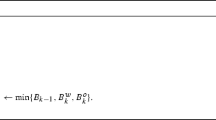Abstract
In this work, based on the gradient method and the relaxed CQ algorithm introduced by López et al. (Inverse Probl. 28, 085004, 2012), we introduce two gradient-CQ algorithms for solving the split feasibility problem in the framework of Hilbert spaces. The main advantage of the proposed method is not only that the variable stepsizes depending on the information from the current iterate not the operator norm are chosen but also that the metric projection onto half-spaces, which is convenient to be calculated, is taken into account. Then both weak and strong convergence are proved under some mild conditions. Finally, numerical experiments in signal processing reveal that the proposed algorithm is effective and outruns those of Yang, López et al., Gibali et al., and others.












Similar content being viewed by others
References
Bauschke, H.H., Combettes, P.L.: A weak-to-strong convergence principle for fejér-monotone methods in Hilbert spaces. Math. Oper. Res. 26, 248–264 (2001)
Bauschke, H.H., Combettes, P.L.: Convex Analysis and Monotone Operator Theory in Hilbert Spaces. Springer, London (2011)
Byrne, C.: Iterative oblique projection onto convex sets and the split feasibility problem. Inverse Probl. 18, 441–453 (2002)
Byrne, C.: A unified treatment of some iterative algorithms in signal processing and image reconstruction. Inverse Probl. 20, 103–120 (2004)
Censor, Y., Elfving, T.: A multiprojection algorithms using Bregman projection in a product space. Numer. Algor. 8, 221–239 (1994)
Dang, Y., Gao, Y.: The strong convergence of a KM-CQ-like algorithm for a split feasibility problem. Inverse Prob. 27, 015007 (2011)
Fukushima, M.: A relaxed projection method for variational inequalities. Math. Program. 35, 58–70 (1986)
Gibali, A., Liu, L.W., Tang, Y.C.: Note on the modified relaxation CQ algorithm for the split feasibility problem. Optimization Letters. 12, 1–14 (2017)
He, S., Yang, C.: Solving the variational inequality problem defined on intersection of finite level sets. Abstr. Appl Anal. https://doi.org/10.1155/2013/942315(2013)
Halpern, B.: Fixed points of nonexpanding maps. Bull. Am. Math. Soc. 73, 957–961 (1967)
López, G., Martín-márquez, V., Wang, F., Xu, H.K.: Solving the split feasibility problem without prior knowledge of matrix norms. Inverse Probl. 28, 085004 (2012)
Qu, B., Xiu, N.: A note on the CQ algorithm for the split feasibility problem. Inverse Probl. 21, 1655–1665 (2005)
Suantai, S., Pholasa, N., Cholamjiak, P.: Relaxed CQ algorithms involving the inertial technique for multiple-sets split feasibility problems. Revista de la Real Academia de Ciencias Exactas, físicas y Naturales. Serie A. Matemáticas, pp. 1–19 (2018)
Wang, F.: On the convergence of CQ algorithm with variable steps for the split equality problem. Numer. Algorithms 74(3), 927–935 (2017)
Wang, F., Xu, H.K.: Approximating curve and strong convergence of the CQ algorithm for the split feasibility problem. J. Inequal. Appl 102085 (2010)
Xu, H.K.: Iterative methods for the split feasibility problem in infinite-dimensional Hilbert spaces. Inverse Prob. 26, 105018 (2010)
Yang, Q.: The relaxed CQ algorithm for solving the split feasibility problem. Inverse Prob. 20, 1261–1266 (2004)
Yang, Q.: On variable-step relaxed projection algorithm for variational inequalities. J. Math. Anal. Appl. 302, 166–179 (2005)
Zhao, J., Zhang, Y., Yang, Q.: Modified projection methods for the split feasibility problem and multiple-sets feasibility problem. Appl. Math. Comput. 219, 1644–1653 (2012)
Acknowledgements
The authors wish to thank Unit of Excellence (UOE62001). Finally, the authors would like to thank the editor and reviewers for value comments to improve this manuscript.
Funding
P. Cholamjiak was supported by Thailand Research Fund and University of Phayao grant no. RSA6180084.
Author information
Authors and Affiliations
Corresponding author
Additional information
Publisher’s note
Springer Nature remains neutral with regard to jurisdictional claims in published maps and institutional affiliations.
Rights and permissions
About this article
Cite this article
Kesornprom, S., Pholasa, N. & Cholamjiak, P. On the convergence analysis of the gradient-CQ algorithms for the split feasibility problem. Numer Algor 84, 997–1017 (2020). https://doi.org/10.1007/s11075-019-00790-y
Received:
Accepted:
Published:
Issue Date:
DOI: https://doi.org/10.1007/s11075-019-00790-y



